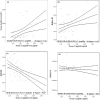Consumption of Fresh Yellow Onion Ameliorates Hyperglycemia and Insulin Resistance in Breast Cancer Patients During Doxorubicin-Based Chemotherapy: A Randomized Controlled Clinical Trial
- PMID: 27352956
- PMCID: PMC5759935
- DOI: 10.1177/1534735416656915
Consumption of Fresh Yellow Onion Ameliorates Hyperglycemia and Insulin Resistance in Breast Cancer Patients During Doxorubicin-Based Chemotherapy: A Randomized Controlled Clinical Trial
Abstract
Purpose: Doxorubicin has been found to be associated with insulin resistance in animal models. Onion, a so-called functional food, is noted to affect the insulin signaling pathway of diabetes in vitro. To our knowledge, this is the first study to investigate the effects of consuming fresh yellow onions on insulin-related indices compared with a low-onion-containing diet among breast cancer (BC) patients treated with doxorubicin.
Methods: This parallel-design, randomized, triple-blind, controlled clinical trial was conducted on 56 eligible BC patients (aged 30-63 years), diagnosed with invasive ductal carcinoma. Following their second cycle of chemotherapy, subjects were assigned in a stratified-random allocation to receive body mass index-dependent 100 to 160 g/d of onion as high onion group (HO; n = 28) or 30 to 40 g/d small onions in low onion group (LO; n = 28) for 8 weeks intervention. Participants, care givers, and those who assessed laboratory analyses were blinded to the assignments (IRCT Registry No.: IRCT2012103111335N1).
Results: The compliance level of participants in the analysis was as high as 87.85%. A total of 23 available cases was analyzed in each group. The daily use of HO resulted in a significant decrease in serum fasting blood glucose and insulin levels in comparison with LO, over the period of study ( P < .001). Posttreatment with HO showed a significant decrease in homeostasis model of assessment-insulin resistance relative to changes in the LO group ( P < .05). A comparison of the changes that occurred throughout pre- and postdose treatments indicated improved quantitative insulin sensitivity check index ( P < .05) and controls on C-peptide in the HO group ( P < .05).
Conclusions: The present study demonstrated the effectiveness of onion to ameliorate hyperglycemia and insulin resistance in BC during doxorubicin-based chemotherapy.
Keywords: breast cancer; doxorubicin; insulin resistance; intervention; onion.
Conflict of interest statement
Figures



Similar articles
-
Effects of Fresh Yellow Onion Consumption on CEA, CA125 and Hepatic Enzymes in Breast Cancer Patients: A Double- Blind Randomized Controlled Clinical Trial.Asian Pac J Cancer Prev. 2015;16(17):7517-22. doi: 10.7314/apjcp.2015.16.17.7517. Asian Pac J Cancer Prev. 2015. PMID: 26625755 Clinical Trial.
-
Effects of raw red onion consumption on metabolic features in overweight or obese women with polycystic ovary syndrome: a randomized controlled clinical trial.J Obstet Gynaecol Res. 2014 Apr;40(4):1067-76. doi: 10.1111/jog.12311. Epub 2014 Mar 10. J Obstet Gynaecol Res. 2014. PMID: 24612081 Clinical Trial.
-
Effect of different doses of metformin on serum testosterone and insulin in non-diabetic women with breast cancer: a randomized study.Clin Breast Cancer. 2012 Jun;12(3):175-82. doi: 10.1016/j.clbc.2012.03.004. Clin Breast Cancer. 2012. PMID: 22607767 Clinical Trial.
-
The Effects of Berberis Vulgaris Juice on Insulin Indices in Women with Benign Breast Disease: A Randomized Controlled Clinical Trial.Iran J Pharm Res. 2018 Winter;17(Suppl):110-121. Iran J Pharm Res. 2018. PMID: 29796035 Free PMC article.
-
Onions: a source of unique dietary flavonoids.J Agric Food Chem. 2007 Dec 12;55(25):10067-80. doi: 10.1021/jf0712503. Epub 2007 Nov 13. J Agric Food Chem. 2007. PMID: 17997520 Review.
Cited by
-
Recent Advances in Bioactive Compounds, Health Functions, and Safety Concerns of Onion (Allium cepa L.).Front Nutr. 2021 Jul 22;8:669805. doi: 10.3389/fnut.2021.669805. eCollection 2021. Front Nutr. 2021. PMID: 34368207 Free PMC article. Review.
-
The Anti-Diabetic Effects of Medicinal Plants Belonging to the Liliaceae Family: Potential Alpha Glucosidase Inhibitors.Drug Des Devel Ther. 2024 Aug 13;18:3595-3616. doi: 10.2147/DDDT.S464100. eCollection 2024. Drug Des Devel Ther. 2024. PMID: 39156483 Free PMC article. Review.
-
A randomized, double-blind, placebo-controlled crossover clinical trial to evaluate the anti-diabetic effects of Allium hookeri extract in the subjects with prediabetes.BMC Complement Med Ther. 2020 Jul 6;20(1):211. doi: 10.1186/s12906-020-03005-3. BMC Complement Med Ther. 2020. PMID: 32631388 Free PMC article. Clinical Trial.
-
Effect of dietary onion (Allium cepa L.) powder as an antioxidant on semen quality, blood biochemicals, and reproductive parameters, as well as immunological variables of rabbit bucks under severe heat stress.Trop Anim Health Prod. 2023 Oct 26;55(6):380. doi: 10.1007/s11250-023-03788-w. Trop Anim Health Prod. 2023. PMID: 37882945
-
Antidiabetic Medicinal Plants Used in Democratic Republic of Congo: A Critical Review of Ethnopharmacology and Bioactivity Data.Front Pharmacol. 2021 Oct 27;12:757090. doi: 10.3389/fphar.2021.757090. eCollection 2021. Front Pharmacol. 2021. PMID: 34776975 Free PMC article. Review.
References
-
- Siegel R, Naishadham D, Jemal A. Cancer statistics, 2012. CA: Cancer J Clin. 2012;62:10-29. - PubMed
-
- Adebamowo CA, Cho E, Sampson L, et al. Dietary flavonols and flavonol-rich foods intake and the risk of breast cancer. Int J Cancer. 2005;114:628-633. - PubMed
-
- Willett WC. Diet and breast cancer. J Intern Med. 2001;249:395-411. - PubMed
-
- Pirouzpanah S, Taleban FA, Atri M, Abadi AR, Mehdipour P. The effect of modifiable potentials on hypermethylation status of retinoic acid receptor-beta2 and estrogen receptor-alpha genes in primary breast cancer. Cancer Cause Control. 2010;21:2101-2111. - PubMed
-
- Bradbury KE, Appleby PN, Key TJ. Fruit, vegetable, and fiber intake in relation to cancer risk: findings from the European Prospective Investigation into Cancer and Nutrition (EPIC). Am J Clin Nutr. 2014;100(suppl 1):394S-398S. - PubMed
Publication types
MeSH terms
Substances
Associated data
LinkOut - more resources
Full Text Sources
Other Literature Sources
Medical

